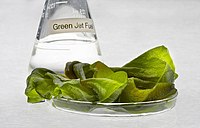
Photo from wikipedia
Simple Summary Microalgae-based biorefineries allow the simultaneous production of microalgae biomass enriched in a particular macromolecule and high-added and low-value products if a proper selection of the microalgae species and… Click to show full abstract
Simple Summary Microalgae-based biorefineries allow the simultaneous production of microalgae biomass enriched in a particular macromolecule and high-added and low-value products if a proper selection of the microalgae species and the cultivation conditions are adequate for the purpose. This review discusses the challenges and future trends related to microalgae-based biorefineries stressing the multi-product approach and the use of raw wastewater or pretreated wastewater to improve the cost-benefit ratio of biomass and products. Emphasis is given to the production of biomass enriched in carbohydrates. Microalgae-bioactive compounds as potential therapeutical and health promoters are also discussed. Future and novel trends following the circular economy strategy are also discussed. Abstract Microalgae have demonstrated a large potential in biotechnology as a source of various macromolecules (proteins, carbohydrates, and lipids) and high-added value products (pigments, poly-unsaturated fatty acids, peptides, exo-polysaccharides, etc.). The production of biomass at a large scale becomes more economically feasible when it is part of a biorefinery designed within the circular economy concept. Thus, the aim of this critical review is to highlight and discuss challenges and future trends related to the multi-product microalgae-based biorefineries, including both phototrophic and mixotrophic cultures treating wastewater and the recovery of biomass as a source of valuable macromolecules and high-added and low-value products (biofertilizers and biostimulants). The therapeutic properties of some microalgae-bioactive compounds are also discussed. Novel trends such as the screening of species for antimicrobial compounds, the production of bioplastics using wastewater, the circular economy strategy, and the need for more Life Cycle Assessment studies (LCA) are suggested as some of the future research lines.
Journal Title: Biology
Year Published: 2022
Link to full text (if available)
Share on Social Media: Sign Up to like & get
recommendations!